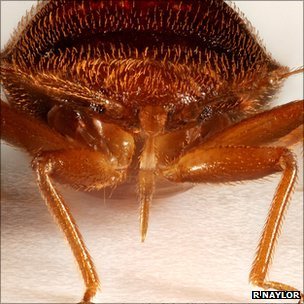科学家发现雄性臭虫排出精子保护液用于防止交配感染。

雄性臭虫如何让精子免受病菌毒害
细菌覆盖臭虫的全身,交配过程中连同精子一起传递给雌性虫体。
研究发表在13期《Congress of the European Society for Evolutionary Biology》上。
臭虫和生活在非洲洞穴中的蝙蝠都因怪异的性生活而闻名。
取代直接交配,雄性臭虫在雌性体内排出精子,这些精子从血液系统中游向卵细胞,并进行受精作用。
雌性臭虫借助肚子结构把雄性生殖器引入到抗病菌的细胞中,从而防止交配过程中病菌的感染。
英国谢菲尔德大学的进化生物学家Oliver Otti 称,雄性臭虫也进化出一种防止交配感染的保护手段。
雄性臭虫分泌出保护蛋白用于防御精子感染,Oliver Otti从大量雄性臭虫提取纯的精子,确保不含有精子保护液。
然后,在一半样本中添加了灭菌的溶酶体,研究人员发现存活的精子超过40%。
雌性臭虫却没有从添加的溶酶体中获得保护作用,他解释道,溶酶体看起来只用于保护精子。
Michael Siva-Jothy 研究表明,雌性臭虫用了自身的溶酶体去防止交配感染。
事实上,雌性臭虫进食之前溶酶体活性升高,Siva-Jothy解释道,臭虫世界中进食很可能是为交配做准备。(生物探索译 Pobee)
生物探索推荐英文原文
Bed bugs protect their sperm from bacteria
Bed bugs protect their sperm against sexually transmitted infections by producing germ-busting ejaculates, scientists have found.
Bacteria covering bed bugs' bodies are transmitted to the female, along with the sperm, during mating.
The results were presented at the 13th Congress of the European Society for Evolutionary Biology.
Bed bugs, and the related bat bugs that live in African caves, are renowned for their bizarre sex lives.
Males, instead of penetrating the female's vagina, pierce her underside and deposit sperm inside the female, where it swims through the insect's blood system to the ovaries to fertilise the eggs.
Female bed bugs protect themselves against the diseases that males transmit with a structure on their bellies that guides the penis into a mass of germ-fighting cells.
Males, it seems, have also evolved a way to fend off the effects of sexually transmitted infections, evolutionary biologist Oliver Otti from the University of Sheffield, UK, told conference attendees in Germany.
Suspecting that males load their ejaculates with proteins that protect sperm, Dr Otti carefully extracted sperm from a number of male bed bugs, being sure not to mix it with the seminal fluid that usually makes up the rest of the ejaculate.
He then mixed the sperm with a "soup" of micro-organisms that he had collected from the outer skin of the bed bugs.
To half of these samples he added lysozyme, a bacteria-killing enzyme known to be active in bed bugs, and saw that 40% more sperm survived in its presence.
Females didn't gain any protection from these introduced bacteria-busting enzymes, he explained; the presence of lysozyme in the ejaculate seemed to be purely to protect sperm.
But other work by Dr Otti's colleague Michael Siva-Jothy, who is also based at the University of Sheffield, shows that females protect themselves from the infections introduced during sex with their own lysozymes.
In fact, females ramp up their lysozyme activity just before they are about to feed. Dr Siva-Jothy explained that this is probably because in the bed bug world, feeding is generally always followed by mating.
"Wounding is a very frequent event during and after copulation, and generally genitals are not that clean, " Dr Otti told BBC News.
He explained that the research that has focused on human sexual transmitted diseases has tended to ignore the microbes that coexist with us on our skin; these microbes are likely also transferred during sex.
"It is not clear what the cost of having them around is," Dr Otti added.
The advantage of studying bed bugs, he said, is that we share many components of our immune system. As a result, scientists can learn much from manipulating the bugs' sex lives to study the consequences on lifespan and offspring production - some of these trade-offs could be relevant to humans.







